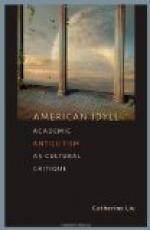* * * * *
His trip to Camp Lewis threw him at once into the midst of the lumber difficulties of the Northwest, which lasted for months. The big strike in the lumber industry was on when he arrived. He wrote: “It is a strike to better conditions. The I.W.W. are only the display feature. The main body of opinion is from a lot of unskilled workers who are sick of the filthy bunk-houses and rotten grub.” He wrote later of a conference with the big lumbermen, and of how they would not stay on the point but “roared over the I.W.W. I told them that condemnation was not a solution, or businesslike, but what we wanted was a statement of how they were to open their plants. More roars. More demands for troops, etc. I said I was a college man, not used to business; but if business men had as much trouble as this keeping to the real points involved, give me a faculty analysis. They laughed over this and got down to business, and in an hour lined up the affair in mighty good shape.”
I wish it were proper to go into the details here of the various conferences, the telegrams sent to Washington, the replies. Carl wrote: “I am saving all the copies for you, as it is most interesting history.” Each letter would end: “By three days at least I should start back. I am getting frantic to be home.” Home, for the Parkers, was always where we happened to be then. Castle Crags was as much “home” as any place had ever been. We had moved fourteen times in ten years: of the eleven Christmases we had had together, only two had been in the same place. There were times when “home” was a Pullman car. It made no difference. One of the strange new feelings I have to get used to is the way I now look at places to live in. It used to be that Carl and I, in passing the littlest bit of a hovel, would say, “We could be perfectly happy in a place like that, couldn’t we? Nothing makes any difference if we are together.” But certain kinds of what we called “cuddly” houses used to make us catch our breaths, to think of the extra joy it would be living together tucked away in there. Now, when I pass a place that looks like that, I have to drop down some kind of a trap-door in my brain, and not think at all until I get well by it.




